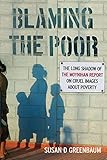Blaming the Poor : The Long Shadow of the Moynihan Report on Cruel Images about Poverty / Susan D. Greenbaum.
Material type: TextPublisher: New Brunswick, NJ : Rutgers University Press, [2015]Copyright date: ©2015Description: 1 online resource (190 p.)Content type:
TextPublisher: New Brunswick, NJ : Rutgers University Press, [2015]Copyright date: ©2015Description: 1 online resource (190 p.)Content type: - 9780813574141
- 9780813574165
- E185.86.U52 G74 2015
- online - DeGruyter
- Issued also in print.
| Item type | Current library | Call number | URL | Status | Notes | Barcode | |
|---|---|---|---|---|---|---|---|
 eBook
eBook
|
Biblioteca "Angelicum" Pont. Univ. S.Tommaso d'Aquino Nuvola online | online - DeGruyter (Browse shelf(Opens below)) | Online access | Not for loan (Accesso limitato) | Accesso per gli utenti autorizzati / Access for authorized users | (dgr)9780813574165 |
Frontmatter -- Contents -- Preface -- 1. Introduction -- 2. Research And Politics: The Culture Of Poverty Knowledge -- 3. Kinship And Family Structure: Ethnocentric Myopia -- 4. There Goes The Neighborhood: Deconcentration And Destruction Of Public Housing -- 5. Crime, Criminals, And Tangles Of Pathology -- 6. Commercializing The Culture Of Poverty -- 7. Ending Poverty As We Know It: And Other Apparently Unreachable Goals -- Notes -- Index -- About The Author
restricted access online access with authorization star
http://purl.org/coar/access_right/c_16ec
In 1965, the late Senator Daniel Patrick Moynihan-then a high-ranking official in the Department of Labor-sparked a firestorm when he released his report "The Negro Family," which came to be regarded by both supporters and detractors as an indictment of African American culture. Blaming the Poor examines the regrettably durable impact of the Moynihan Report for race relations and social policy in America, challenging the humiliating image the report cast on poor black families and its misleading explanation of the causes of poverty. A leading authority on poverty and racism in the United States, Susan D. Greenbaum dismantles Moynihan's main thesis-that the so called matriarchal structure of the African American family "feminized" black men, making them inadequate workers and absent fathers, and resulting in what he called a tangle of pathology that led to a host of ills, from teen pregnancy to adult crime. Drawing on extensive scholarship, Greenbaum highlights the flaws in Moynihan's analysis. She reveals how his questionable ideas have been used to redirect blame for substandard schools, low wages, and the scarcity of jobs away from the societal forces that cause these problems, while simultaneously reinforcing stereotypes about African Americans. Greenbaum also critiques current policy issues that are directly affected by the tangle of pathology mindset-the demonization and destruction of public housing; the criminalization of black youth; and the continued humiliation of the poor by entrepreneurs who become rich consulting to teachers, non-profits, and social service personnel. A half century later, Moynihan's thesis remains for many a convenient justification for punitive measures and stingy indifference to the poor. Blaming the Poor debunks this infamous thesis, proposing instead more productive and humane policies to address the enormous problems facing us today.
Issued also in print.
Mode of access: Internet via World Wide Web.
In English.
Description based on online resource; title from PDF title page (publisher's Web site, viewed 30. Aug 2021)


